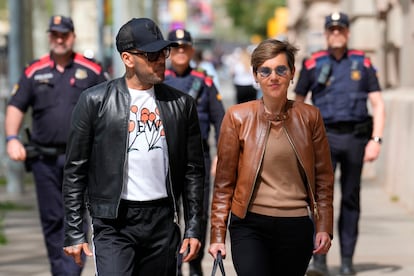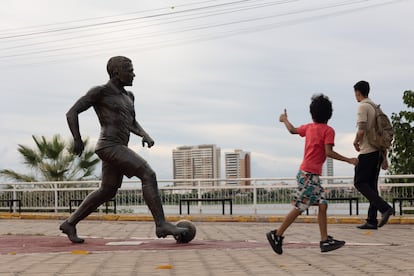Dani Alves seeks reversal of rape conviction, restoration of his public image and a return to soccer
The player, released on bail pending a final sentence, has lodged an appeal for an acquittal having maintained his innocence throughout the trial


Dani Alves ' career in the elite of world soccer ended, although he was not aware of it at the time, on January 20, 2023 when a Barcelona judge investigating the rape of a young woman at the Sutton nightclub in the Catalan city ordered his incarceration in preventive custody. Alves, who a month earlier had represented Brazil at the Qatar World Cup at the age of 39, was at the time playing for Pumas in Mexico. The club unilaterally terminated his contract upon hearing the news of his imprisonment. His last match as a professional player was on January 8, against FC Juárez. Since then, he has only seen a ball in the courtyard of the Brians 2 prison in Barcelona, where he had been held for the past 14 months.
But Alves has been a free man for the past two weeks. The Barcelona High Court agreed to his provisional release, pending final judgment on the case, after sentencing him to four and a half years in prison as the perpetrator of the sexual assault. The former Barça defender has told his closest friends and family of his innermost conviction that, sooner or later, he will be acquitted and will be able to restore his public image. And that, in time, he will be able to continue working (although no longer as a player) in the world of soccer.
Since his release, Alves has spent most of his time at his home in Esplugues de Llobregat, where he lives with his wife, the model Joana Sanz. The house, which he bought during his time as a Barça defender for about €5 million ($5.4 million), means he is registered as a resident in Barcelona. The judges took this factor into account in concluding that the risk of Alves absconding — the reason for which he was placed in provisional detention — had been attenuated. Alves was released after posting bail of €1 million ($1.08 million) and surrendering both his passports (Spanish and Brazilian). The court also imposed a restraining order that prohibits him from coming within one kilometer (0.6 miles) of his victim or from having any communication with her.
Alves paid €150,000 in civil damages to the victim, a disbursement that was key in his conviction and his release: although the prosecution was seeking nine years in prison for rape, judges finally imposed a lower sentence of four and a half years due to the mitigating circumstance of reparation for damages.
Isolated from the noise generated by the case, the footballer sporadically receives friends while he ponders his future. Although his assets are frozen in Brazil due to a lawsuit involving his ex-wife, he has a more than generous economic cushion — he is one of the most successful footballers in history — and, in addition, he is receiving multi-million-euro returns following successful proceedings against the Spanish Tax Agency. Alves, however, has been left without a trade and without income. After his contract with Pumas was terminated, his sponsorship and advertising contracts were also canceled.
Alves is seeking not just a reduced sentence, but an acquittal. He has maintained his innocence throughout the trial although the judicial system, for now, says otherwise. The sentence handed down by the Barcelona High Court considers it proven that Alves penetrated the 23-year-old victim in the bathroom of Sutton’s VIP area without her consent and with “the use of violence.”
The judges gave credibility to the victim’s testimony about the non-consensual penetration in the bathroom, but admitted that her version of events over the previous half-hour in Sutton’s VIP area does not correspond to what the security cameras show. The victim described a feeling of fear and repulsion towards the footballer, while the images appear to show closeness and mutual interest.

Alves wants to use that to reverse the sentence and has requested an acquittal in an appeal that has already been presented to the High Court of Justice of Catalonia. “Between 10% and 20% of the victim’s statements have been accepted as truthful,” said Alves’ defense team, led by Inés Guardiola, a criminal lawyer who successfully achieved the player’s desire to be released on bail. According to Guardiola, it is not so much that there are two conflicting and irreconcilable versions, but that Alves’ account has been “verified by means of objective evidence,” such as biological traces and Dermatoglyphic evidence (footprints) found inside the bathroom.
Regarding the alleged use of violence, the defense appeal document points out that no injuries of any kind were found on the victim, apart from a small wound on the knees that is compatible with the practice of fellatio: three hours after the events, DNA was found in the young woman’s oral cavity.
“Alves has been convicted with the statement of a complainant that is incompatible with scientific evidence,” the defense concludes. For the court, however, it was clear that the main issue, consent, did not occur. “There is no evidence,” the court’s sentence said, that the victim “gave her consent” to the penetration; and furthermore, it considered it proven that the player “subdued the victim’s will with the use of violence.”
The definitive sentence may still take between six months and a year to be issued, and in case of a new conviction, Alves could still appeal to the Spanish Supreme Court. While Alves’ lawyers are seeking his acquittal, prosecutors want his sentence increased to nine years. In the meantime, and if he continues to fulfill his obligations, Alves will remain on probation. The player has already stated that he does not intend to leave Spain and, although he is eager to provide a public statement, he remains silent on the instructions of his lawyers.
Sign up for our weekly newsletter to get more English-language news coverage from EL PAÍS USA Edition
Tu suscripción se está usando en otro dispositivo
¿Quieres añadir otro usuario a tu suscripción?
Si continúas leyendo en este dispositivo, no se podrá leer en el otro.
FlechaTu suscripción se está usando en otro dispositivo y solo puedes acceder a EL PAÍS desde un dispositivo a la vez.
Si quieres compartir tu cuenta, cambia tu suscripción a la modalidad Premium, así podrás añadir otro usuario. Cada uno accederá con su propia cuenta de email, lo que os permitirá personalizar vuestra experiencia en EL PAÍS.
¿Tienes una suscripción de empresa? Accede aquí para contratar más cuentas.
En el caso de no saber quién está usando tu cuenta, te recomendamos cambiar tu contraseña aquí.
Si decides continuar compartiendo tu cuenta, este mensaje se mostrará en tu dispositivo y en el de la otra persona que está usando tu cuenta de forma indefinida, afectando a tu experiencia de lectura. Puedes consultar aquí los términos y condiciones de la suscripción digital.








































